Julian Corbett was born in 1854 and after becoming a barrister in 1877 he practised law until 1882. At that point he turned to writing as a career beginning with historical fiction often with a maritime theme. That led on to commissions to write a couple of biographies of historical figures including Francis Drake. He then accepted an invitation to edit a collection of documents on the Spanish War which kickstarted his interest in naval history and strategy.
In a wide ranging and extensively researched book Andrew Lambert cogently demonstrates how Corbett became the leading figure in both writing and lecturing about maritime strategy and the influence he had on contemporary thinking in creating a uniquely ‘British way’.
With Britain being an island nation with a large overseas Empire control of the seas was required for economic trade. Wars were costly and disastrous and so a united Europe was highly desirable with the result that Britain would not have to involve itself in continental conflict or if it did it should be in a limited capacity. It’s primary weapon was economic attrition and it avoided the various costs of mass conscription.
Through studying and writing about previous conflicts and battles such as The Seven Years War and Trafalgar Corbett was able to extrapolate strategic aims and make them applicable and relevant to his own times. Drawing and improving on previous thinkers such as Clausewitz Corbett put command of the sea at the centre of his system with ‘the combined action of army and navy the key to success’ in order to ‘secure maritime/economic advantage and prevent the creation of a single continental hegemon’.
In Trafalgar Corbett showed how Britain’s limited maritime strategy had thwarted Napoleon’s ambitions through the use of economic warfare and limited military intervention in Europe using continental coalitions and without the need for a conscripted army. This model of strategy remained British policy until 1914. As Lambert states the difference between 1814 and 1918 was not the outcome which remained the same in both cases but the cost. Britain went to war in 1914 without a considered strategy but Corbett was only too aware of the price to the nation and it’s Senior Service.
When the First World War broke out four ministers resigned over the decision to go to war and the Cabinet was split over a continental role and became swayed by the arguments of military experts representing the Army resulting in Britain becoming embroiled in the horrors of the Western Front. Corbett continued to play an important role during and after WW1 in helping to shape policy and in it’s documentation. He also provided a critiquing analysis of the failures of Gallipoli and Jutland and in fact helped to rescue the reputation of the latter to some degree. Winston Churchill is lambasted by Lambert though for his often ill judged actions during the conflict.
Andrew Lambert must be congratulated on producing a sterling account of Julian Corbett’s life and work which still resonates today in demonstrating how a deep understanding of history can affect and influence contemporary policy.
The British Way of War: Julian Corbett and the Battle for a National Strategy, by Andrew Lambert is out now and is published by Yale University Press.
Benjamin Peel is the author of the play Not a Game for Girls







